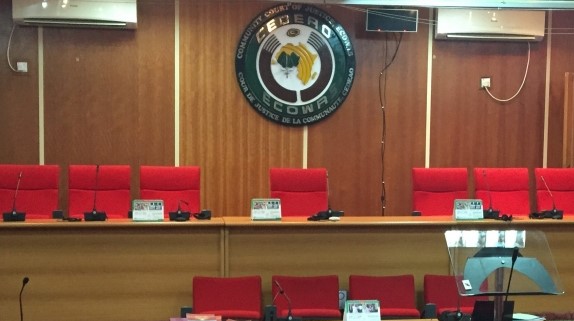Implement ECOWAS court judgments
The President of the Economic Community of West African States (ECOWAS) Court, Justice Edward Amoako Asante, recently decried that 70 per cent of the court’s judgments are not implemented by member countries. Speaking last week at the official opening ceremony of the new office building of the Community Court of Justice of ECOWAS in Abuja, […]

ECOWAS Court
The President of the Economic Community of West African States (ECOWAS) Court, Justice Edward Amoako Asante, recently decried that 70 per cent of the court’s judgments are not implemented by member countries.
Speaking last week at the official opening ceremony of the new office building of the Community Court of Justice of ECOWAS in Abuja, Justice Asante lamented that, “The effectiveness of the court has been circumscribed by poor enforcement of its decisions, which stands at about 30 per cent despite the court’s impressive record of decisions and courage attributable to the independence and character of the judges.”
The ECOWAS Court of Justice was voluntarily established by member states “To remain an independent, reliable, efficient and accessible legal and judicial institution of the community, playing a strategic role in establishing and sustaining an enabling legal environment for the achievement of community aims and objectives.” It is also mandated “to discharge and promote its judicial function of interpreting and applying community texts, as well as to ensure the protection of human rights in an efficient, timely and cost effective manner, with the support of well-trained and motivated staff.”
In 2005, ECOWAS adopted a protocol to empower the court to determine cases of human rights violation in the region.
This is why the revelation by Justice Asante is, to put it charitably, shocking. Also, it is not a good news for a region still battling with military putsches. But it is not the first time it is being said. Human rights lawyer, Femi Falana, while presenting a paper at a conference on with the theme: “ECOWAS Court: Achievements, Challenges and Prospects”, hosted by the ECOWAS Court of Justice in Lome, Togo, from November 22 to 24, 2021, said, “It is particularly worrisome to note that some of the member states that appointed competent national authority for the purpose of receipt and processing of the execution of judgments of the court have been accused of not complying with the decisions of the court. It is common knowledge that the rate of compliance with the judgments of the court is embarrassingly low.”
But what will stop ECOWAS member states from implementing the court’s judgments? Do they doubt the integrity of the judges who were appointed by the ECOWAS Authority of Heads of State of Government?
For instance, when in 2016 a former National Security Adviser (NSA), Sambo Dasuki, secured a judgment from the ECOWAS Court ordering his release from detention, Okoi Obla, then an adviser on prosecution to President Muhammadu Buhari, said the Nigerian government was not obligated to obey the ruling.
The court, on July 14, 2022, again ordered the Nigerian government to un-ban the use of micro blogging site, Twitter, in the country following a suit by the Socio-Economic Rights and Accountability Project (SERAP) and 176 other concerned Nigerians after the federal government banned its use in the country. That ruling too was not obeyed.
Section 12(1) of the Nigerian constitution states that: “No treaty between the federation (Nigeria) and any other country shall have the force of law except to the extent to which any such treaty has been enacted by the National Assembly.”
However, Article 19(2) of the Protocol (A/P1 ECOWAS member countries should, therefore, make a provision in their legal books to make it possible to implement the decisions of the regional court without any hindrance. They must resist the temptation of selecting which ruling to respect or reject. The presence of the court, no doubt, expands the frontiers of justice, particularly with regards to human rights issues, making it possible for citizens to seek redress when the need arises. Doing the contrary will mean the governments themselves are denying their citizens justice, which in turn can lead to a state of lawlessness, and by extension defeat one of the very purposes of creating the ECOWAS itself. To ensure effectiveness, countries must also stop taking frivolous cases before the court. The ECOWAS member states must not disrespect the decisions of a court they voluntarily established. The heads of government should convene a meeting to resolve this issue and find a way forward on how the judgments coming from the court will be respected. The opposite can only be a recipe for anarchy. Leaders should know that there is truism in the aphorism that: “Justice delayed is justice denied.” If for any reason the member countries will not abide by the judgments of the ECOWAS Court of Justice, which helps democracy and rule law, they should consider disbanding it forthwith. It amounts to waste of resources for member states to expend money on the running of the court, only for its judgments to be discarded.
